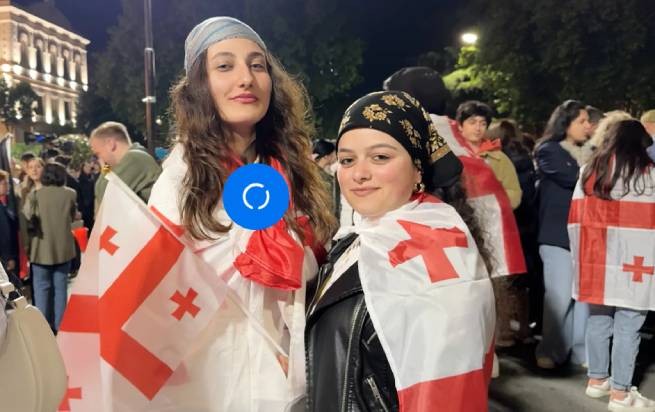The new law on foreign influence caused a mixed reaction both in Georgia and in the West, protests in the country and a review of relations from outside EU and the USA.
How do the residents of the country feel about the law? correspondent Euronews, having visited the republic. She listened carefully and impartially to both sides, opponents and supporters of the document that divided society.
The Law on Transparency of Foreign Influence, adopted by the Georgian Parliament on May 14, caused a wave of large-scale protests, giving rise to criticism of the country in the international arena. Opponents of the law argue that it was inspired by Moscow and could jeopardize the republic's European destiny. Researcher Mamuka Kotetishvili, who protested near parliament with his family, is convinced:
“This is a law against democracy, against human rights. It will affect not only government bodies, but also all spheres of activity in Georgia, from healthcare to agriculture.”
The bill would require any entity that receives more than 20% of its funds from abroad to register as an “organization supporting the interests of a foreign power” and thus come under government control. The new requirement, according to experts, may affect at least 25 thousand NGOs from different sectors. Opponents of the law say it copies the “original” passed in Russia in 2012, which made it possible to suppress any voices the Kremlin dislikes.
Independent media and human rights activists in Georgia believe that they are at particular risk. Co-founder and editor-in-chief of the online publication “Publika” Lika Zakashvili says:
“The fact that we are labeled as persecutors of foreign interests has only a negative connotation in the current context. It means that we are foreign agents. Operating in such a framework will completely destroy trust in the media.”
The editor-in-chief of the publication clarifies that By law, the Ministry of Justice has the right to access the processing of personal information of foreign agent organizations:
“This is especially dangerous for the media, because we keep personal information about our sources. This is a risk for everyone!”
“The law will silence the free,” journalists say. Lika and her colleagues have already received threats. The director of the Georgian branch of ISFED, Nino Dolidze, head of a reputable election observation organization, also thinks so:
“The government has decided to close down all those who talk about problems, because they see this as a threat to their power. Our goal is to support free and fair elections in our country, we do not deal with the interests of another country. We will never sign up for such a register, and this will create problems. We will have fines, sanctions. Ultimately, this will lead to the closure of organizations involved in issues of freedom of elections, corruption, human rights – any monitoring activity. This will suit the government, as it will silence all free voices.”
Meanwhile the party in power and the government deny the similarities between Georgian and Russian laws, arguing that the fears of European officials who called for the document to be revoked are unfounded. The head of the European Integration Committee of the Georgian Dream party, Maka Bochorishvili, explains:
“Questions arise about the transparency of the funding of these organizations. Today we are talking about their wider participation in the political decision-making process in Georgia. It is important to ensure full transparency for our citizens, to understand who and why is behind the opinions they voice.”
She assures us that this is only about registration:
“The article requiring registration specifies that the law cannot be used to stop the activities of NGOs. We are ready to discuss any legal recommendations regarding the legislation. If it is necessary to bring it closer to European standards, then yes, we are for it.”
But Georgian President Salome Zurabishvili has no doubt: the law was inspired by Russia. She used her veto power, calling for the document to be repealed. The President clarifies that the law gives reason to doubt the intentions of Georgia’s long-term partners and friends from Europe and the United States, and erects a “real obstacle” to the republic’s European integration. She clarifies in an interview: “I have already used the word ‘sabotage’ and I can use it again.”
Zurabishvili has no doubt that the veto will be overcome. In her opinion, the activity of civil society has been a plus in the current situation:
“The law will be passed, the veto will be overridden, perhaps some minor and uninteresting amendments will be made to the text. And this energy of society needs to be used. The main thing now is to make progress towards the elections. Through the elections we will hold a referendum on Europe. The EU must give a clear message understand that sanctions will not be imposed against Georgia until the voters’ point of view is voiced on voting day.”
According to opinion polls, more than 80% of Georgians want their country to join the European Union. At the forefront of protests against the law on foreign agents are Georgian youth and students, who embody the pro-Western part of society. There is a real ideological war going on between them and the conservatives, who for the most part support the government. 22-year-old sociology student Megi is convinced that much will depend on the country’s “will” to join the EU. She says emotionally:
“It’s no longer just “No to Russian laws!” Now we are fighting in the plane of “No to the Russian regime!” and “Yes to Europe!” We take to the streets every day, we have to fight. And we are preparing for elections because we want to live in a free country.”







More Stories
Hurriyet: “Greece asked Turkey for permission to lay cable – Turkish jurisdiction recognized”
France: 'Chaos' on trains and metro. Airport evacuated. Dozens of attacks on athletes and tourists
What's Happening to America's Presidential Candidates (Video)